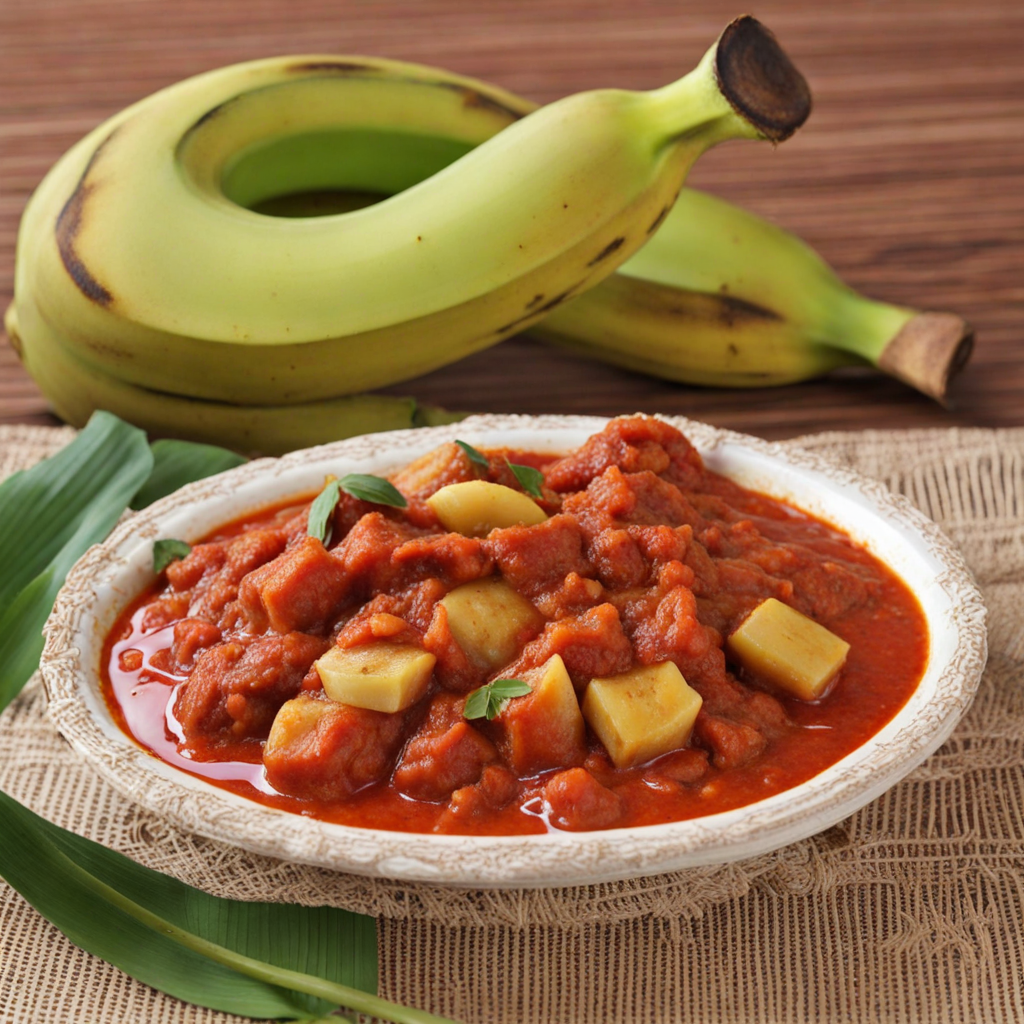Ubugali
Ubugali, a staple food in Burundi, is a simple yet satisfying dish made from cassava flour or maize flour, mixed with water and cooked to a thick, dough-like consistency. This versatile staple is enjoyed by many as a central part of their daily meals. The preparation involves stirring the flour and water mixture over heat until it reaches the desired texture, which is often firm enough to shape into balls or slices. Ubugali is known for its neutral flavor, making it an excellent accompaniment to a variety of savory dishes, allowing it to absorb the flavors of sauces and stews served alongside it. Traditionally, Ubugali is eaten with the hands, often pinched off in small pieces and rolled into balls to scoop up accompanying dishes. It pairs beautifully with flavorful meats, vegetables, and rich sauces, providing a hearty base that complements the more intense flavors of the meal. In Burundian culture, Ubugali is not just food; it represents a communal experience, often shared among family and friends during gatherings, reinforcing connections and hospitality. For those exploring new tastes, Ubugali offers an intriguing experience as it encourages the discovery of various pairings, from spicy stews to fresh vegetable dishes. The texture of Ubugali is both satisfying and comforting, making it a beloved choice in Burundian cuisine. As you venture into the world of Ubugali, you'll find it to be an inviting canvas for flavors, rich in culture and tradition, and a true embodiment of the heart of Burundian meals.
How It Became This Dish
The History of Ubugali: A Culinary Staple of Burundi #### Origins of Ubugali Ubugali, a staple food in Burundi, is a form of stiff porridge made primarily from maize flour, cassava flour, or sorghum, depending on regional availability and preference. The dish's roots trace back to the agricultural practices of the Bantu-speaking peoples who settled in the region centuries ago. Maize, introduced by European colonizers in the 16th century, quickly became a staple crop in many East African countries, including Burundi. The adaptation of maize into local diets gave rise to ubugali, which has become a cherished symbol of Burundian cuisine. Historically, the preparation of ubugali was closely tied to the agricultural cycles of the country. With Burundi's fertile soil and favorable climate, communal farming practices flourished, allowing families to grow their own maize or cassava. This self-sufficiency meant that ubugali was not just a food item but a representation of sustenance and resilience in a land often characterized by its challenges, including political strife and economic hardship. #### Cultural Significance In Burundian culture, food is not merely for sustenance but is steeped in social and cultural significance. Ubugali holds a central place in this narrative. It is often served as an accompaniment to various stews, vegetables, and proteins, making it a versatile foundation for meals. Traditionally, it is eaten by hand, a practice that fosters a sense of community and togetherness at the dining table. Sharing food is a vital component of Burundian hospitality, and ubugali is often prepared in large quantities to ensure that all guests are fed. Ubugali also features prominently in various ceremonies and celebrations, including weddings, funerals, and religious festivals. It symbolizes unity and togetherness, as families and communities gather to share a meal. The preparation of ubugali can be a communal affair, with family members or neighbors coming together to cook and celebrate their bonds. This communal aspect of eating and preparing ubugali reflects the larger social fabric of Burundian culture, where cooperation and support are vital in overcoming challenges. #### Development Over Time The evolution of ubugali mirrors the historical shifts in Burundi's society. During the colonial period, the introduction of new agricultural methods and crops altered the landscape of Burundian cuisine. The reliance on maize grew, leading to the establishment of ubugali as a primary food source. Over the years, different regions developed their variations of ubugali based on available ingredients, local tastes, and cultural influences. For instance, in some areas, ubugali made from cassava flour is preferred, while in others, a mix of flours might be used to enhance flavor and texture. The post-independence period in the 1960s and 70s saw significant political changes in Burundi, which were reflected in the food culture. The civil unrest and violence during this time led many families to rely on staple foods that were easy to prepare and accessible, further solidifying ubugali's role as a comfort food. In times of scarcity or hardship, ubugali became a symbol of survival, representing the ability to persevere despite adversity. In the modern era, globalization has introduced new culinary influences to Burundi, yet ubugali remains a beloved and essential part of the diet. While urbanization has led to changes in eating habits—such as the incorporation of more diverse ingredients and fast food—many Burundians still return to ubugali as a comforting reminder of their heritage. Street vendors often sell ubugali with different accompaniments, making it accessible to a younger generation that seeks traditional flavors in a fast-paced world. #### Ubugali in Contemporary Burundi Today, ubugali continues to play a crucial role in Burundian cuisine. It is not only a source of nourishment but also a culinary canvas upon which different flavors and textures can be layered. Accompaniments such as grilled meats, leafy greens, and spicy sauces enhance the dish, allowing it to adapt to the preferences of different families and communities. The dish's adaptability is a testament to its enduring significance in Burundian life. Moreover, there is a growing movement within Burundi to celebrate and preserve traditional foods, including ubugali. Initiatives aimed at promoting local agriculture and traditional cooking practices are gaining traction, as people recognize the importance of their culinary heritage. Community events often feature traditional cooking demonstrations, where the preparation of ubugali becomes a focal point for education and cultural exchange. #### Conclusion Ubugali is more than just a dish; it is a vibrant part of Burundian identity, encapsulating the country's history, culture, and resilience. Its origins rooted in the agricultural practices of the Bantu people, ubugali has evolved alongside Burundi's societal changes, adapting to the challenges and transformations of the times. As a staple food that fosters community and celebrates togetherness, ubugali remains a symbol of hope and perseverance, embodying the spirit of the Burundian people. As Burundi continues to navigate the complexities of modern life, ubugali stands as a culinary anchor, reminding its people of their rich heritage and the communal bonds that are nourished through shared meals. Whether enjoyed at a grand celebration or a humble family dinner, ubugali will undoubtedly continue to occupy a cherished place on the plates and in the hearts of Burundians for generations to come.
You may like
Discover local flavors from Burundi







